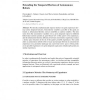Free Online Productivity Tools
i2Speak
i2Symbol
i2OCR
iTex2Img
iWeb2Print
iWeb2Shot
i2Type
iPdf2Split
iPdf2Merge
i2Bopomofo
i2Arabic
i2Style
i2Image
i2PDF
iLatex2Rtf
Sci2ools
157
click to vote
AMIRE
2005
Springer
2005
Springer
Extending the Temporal Horizon of Autonomous Robots
Abstract. We introduce mathematically rigorous metrics on agent experiences having various temporal horizons. Sensorimotor variables accessible to the agent are treated as information-theoretic sources modelled as random variables. The time series from the sensorimotor variables over a given temporal region for different behavioural contexts ground an agent-based view of the agent’s own experiences, and the information-theoretic differences between sensorimotor experiences induce a metric space structure on the set of the agent’s possible experiences. This could allow an autonomous mobile robot to locate and navigate between its sensorimotor experiences on a geometric landscape (an experiential metric space) whose points are its possible experiences of a given temporal scope and in which nearby points are similar experiences. 1 Motivation and Overview In order to mathematically formalize and exploit the notion of temporally extended episodes of experience for autonomous robots, we ...
Related Content
| Added | 26 Jun 2010 |
| Updated | 26 Jun 2010 |
| Type | Conference |
| Year | 2005 |
| Where | AMIRE |
| Authors | Chrystopher L. Nehaniv, Naeem Assif Mirza, Kerstin Dautenhahn, I. René J. A. te Boekhorst |
Comments (0)

